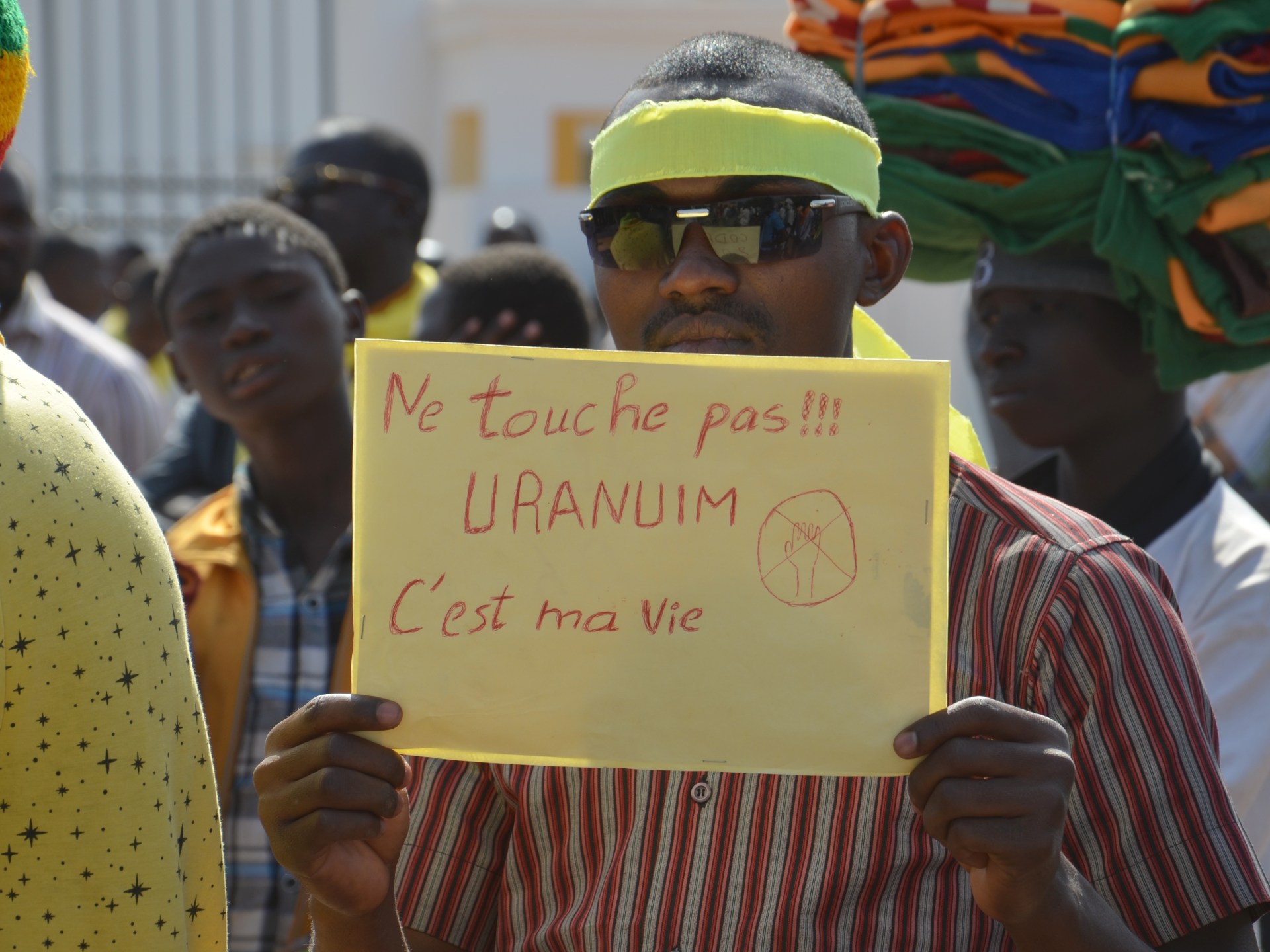The price of uranium has risen slightly since last week’s military coup in Niger as mining operations have continued in the world’s seventh-largest producer of the radioactive metal, but a consultancy says prices may rise in the coming weeks.
The spot price of uranium, widely used for nuclear energy and treating cancer, crept up to $56.25 a pound on Monday from $56.15 a week earlier, market research firm and consultancy UxC said on Tuesday.
The price has doubled over the past three years but is nowhere near a peak of $140 in 2007.
Ben Godwin, head of analysis at London-based Prism Political Risk Management, told Al Jazeera that current events in Niger, which produces 4 percent of the world’s uranium supply, could be critical to Europe.
“It [the coup] is certainly a topic of great interest in the moment, particularly as uranium markets are very, very tight at the moment,” he said. “Demand has been going up over the last few years, and this year, we’ve seen the uranium spot price go up by nearly 40 percent year to date.”
French nuclear fuels company Orano, which operates uranium mines in the West African country, said on Tuesday that its operations continued despite plans by France to evacuate its citizens from Niger and cut aid. Ninety-nine percent of its staff in the country are Nigerien nationals, Orano said.

The spot price is little changed also because Orano sells uranium on long-term contracts and the summer months are slow in the spot market, said Jonathan Hinze, president of UxC.
“An event like this could take a bit more time to seep into the market psychology. We could very well still see bigger impacts in the days and weeks to come,” he told Reuters news agency. “All indications would be that this would be a catalyst for upward moves in the uranium price, given the overall tight supply/demand balance in uranium at this time.”
The European Union’s nuclear agency, Euratom, said on Tuesday that it saw no immediate risk to nuclear power production in Europe should Niger cut its deliveries of uranium because utilities in the bloc have inventories to last for three years.
Niger was the second-largest supplier of natural uranium to the EU last year, Euratom said.
But Godwin also warned that there could also be an impact on Niger’s finances as half of its uranium exports currently go to France and the wider European Union.
On Monday, the officers who seized power in Niger last week detained senior politicians, including the mines minister, defying international calls to restore democratic rule.
deleted by creator
I think, the point of the title/article was to say that a larger increase will follow in coming weeks. That the current small increase isn’t yet everything to come from this…
Glad we count on actually renewable energy - Germany
Last I checked Germany uses a significant amount of natural gas
We do. Mostly for heating in the winter months, though.
It’s not loading right now, as I post this, but here’s live statistics of our renewable energy production: https://energy-charts.info/charts/consumption_advice/chart.htm?l=en&c=DE
On warm summer days, we often produce more than 100% of our power consumption from renewable energy.
I guess you don’t count transportation in these statistics
My understanding is that these statistics are specifically for electricity use/production. So, electrified transportation will play into these statistics, but gas- or otherwise powered transportation will not.
I agree. Electrified transportation will require levels of electricity production several orders of magnitude higher than current ones. No way to provide this amount of power with hydro/sun/wind alone.
German experts seem mostly concerned about the logistics. Even if we built hundreds of nuclear power plants, we just couldn’t pump enough juice through our power grid to reach deep into the residential areas, where power usage will increase the most (from EVs, electrical heating etc.).
There are efforts to simply reduce energy consumption with e.g. better public transport and heat pumps, but a big part of our strategy will also involve power production and storage in those residential areas, by residents.
And that’s where we end up back at solar power, because you can easily put solar on roofs and balconies. Then you can directly use that power or sell it on the market. Or if you don’t need your EV full for the next trip, you can store power in its battery while it’s cheap and sell it when the price is high.
Yep, I agree 100℅. In the end, we won’t have the beginning of a solution until people start using less energy. Furthermore, different infrastructures call for different energy mixes. That’s why we need to find a way to let every EU country run its energy policy while allowing for the common market to protect consumers. And that’s a tough one.
A mid-sized EV driven the German average consumes 300-400W averaged over the year or about the same amount of energy as a mercury street light bulb.
Additionally Solar alone has a much higher limit than any other generation method.
That’s great, but until the storage of renewable energy improves I still see nuclear as an important tool in a carbon neutral power grid.
Nah, nuclear is is not a good transition power source as it takes way to long in all regards. We are faster just building up wind, solar and hydro electricity system than replacing the current stuff with nuclear, yes we should have run the existing ones longer, but that was not possible.
Too long to build functioning reactors? As far as Germany’s existing reactors are concerned, their decommissioning was a political decision from what I’ve read. Would love to hear evidence to the contrary if you have it.
Decommission was a thing known for years, recommissioning the ones shut down would take at least 2 years only to repair and safety check so they can order fule…
The Operators where allowed to skip maintenance and some checks because it was unnecessary in face of the shutdown, they don’t have fule as it literally run out (long planned)
Yes it was a political decision, but that decision was Carved in stone 2011.
And yes, building a new Reactor takes about 10 years, if not longer.
Its faster focusing on actually renewable energy and its more reliable. (also more Economically suitable)
I disagree.
It has been explained over and over. All wind+hydro+solar resources in Europe will never be enough to cover the continent’s energy needs at current levels of living standards.
If you want to keep your car, your heating, your industry and everything else, you are going to need oil/gaz/nuclear in the short to medium term.
Now the climate crisis is here. It is killing real people right now and we need to act. Nuclear has many issues but it certainly can help reduce some co2 emissiins which is the No 1 priority.
Germany’s primary energy is about 4.5kW per person.
Without the waste heat inherent in using thermal generation this is about 2.4kW per person.
The worst actually populated parts of europe have about 1kWh/m^2/day of solar resource in mid winter and current gen PV captures a quarter of this.
So that’s 240m^2 per person for everything or about 5% of the land.
Any amount of transmission or seasonal demand shifting or storage or wind or hydro or not being in northern ireland reduces this to just the inhabited areas and agriculture that actively benefits from agrivoltaics. Currently commercialising tech is also better.
So you may have repeated the lie over and over, but that doesn’t make it true.
Any amount of transmission or seasonal demand shifting or storage or wind or hydro
Inexistent at scale. Solar and wind cannot be controlled. You would need millions of km of copper wire to create a sustainable grid, that you don’t have. Storage is marginal. You are living In a nice dreamy land.
Cope nuclear baby. Your “explained” is nothing against reality and innovation.
Not counting oil, which is overwhelmingly used for transportation in Germany and everywhere else
Yeah, we may have had bad experiences with Chernobyl, but I’m especially tired of all the political drama trying to import gas or oil from other countries. Especially countries with extremist regimes. I don’t need that for nuclear fuel, too.
Unfortunately, though, France’s nuclear power will be affected, so they’ll start importing power from us and cause our power prices to rise, much like last year…
Yeah glad the wind is currently great…
100% renewable isn’t just a matter of climate, but also a matter of independence and security. (btw a big point against Hydrogen from outside EU)





